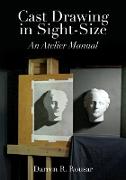- Start
- Cast Drawing in Sight-Size
Cast Drawing in Sight-Size
Angebote / Angebote:
Cast Drawing in Sight-Size is your atelier manual for drawing plaster casts in Sight-Size.
That's true regardless of where you are currently attending an atelier and even if you're not. In other words, it is for everyone who is beginning their journey of learning how to see accurately and to draw what they see. It is also more than that. The concepts taught in it are worth revisiting at no matter what stage you are in your studies.
What is Sight-Size?Sight-Size is an arrangement of the artist, their subject and their artwork that allows the artist to see the subject and artwork visually one-to-one.
Why is learning to draw using Sight-Size so effective?
This question is best answered by briefly explaining one of the alternatives, which is variously called Comparative Measuring or Proportional Drawing. Regardless of the chosen term, the process is centered on scaling your artwork to your source. In other words, you are drawing what you see either larger or smaller than you actually see it. Scaling, while an important skill to acquire, requires that you not only achieve an accurate shape but also enlarge or reduce that shape at the same time. Due to that, scaling needlessly complicates the process of learning to see.
Conversely, Sight-Size more easily teaches you to accurately see because your drawing is meant to be done in the same size that you see the source. You do not have to visually scale. Once your eye is trained, should you then desire to draw proportionally it becomes a simple matter to scale your accurate vision.
Sight-Size is the only approach to drawing that puts the focus firstly on objective, accurate sight. You will learn to see, and that's what the Sight-Size approach is primarily about.
Why Cast Drawing?The best answer to that comes from the primary teacher of two of my own, R.H. Ives Gammell:"For centuries drawing from statues, or from plaster casts of statues, was considered the ideal starting point for a number of excellent reasons. Casts do not move, their uniform whiteness simplifies the problem of modeling and prepares the student to cope with the greater complexity of values he will find in the human body, and the stylized forms of antique statues educate his eye. There is no substitute of comparable worth. But it is a mistake to treat cast drawing as a drudgery to get through with and then to put away with other childish things. There are many lessons to be learned from drawing and painting from casts which completely escape the beginner."*
So what can you expect from this book?Once again, consider it to be your atelier manual. It takes you through the entire process of drawing casts in Sight-Size, and it does so in the same way as is done at many of the traditional ateliers.
*As quoted in R. H. Ives Gammell, An Autobiography of His Life and Work, (unpublished, written during the late 1960s and early 1970s).
Folgt in ca. 10 Arbeitstagen
